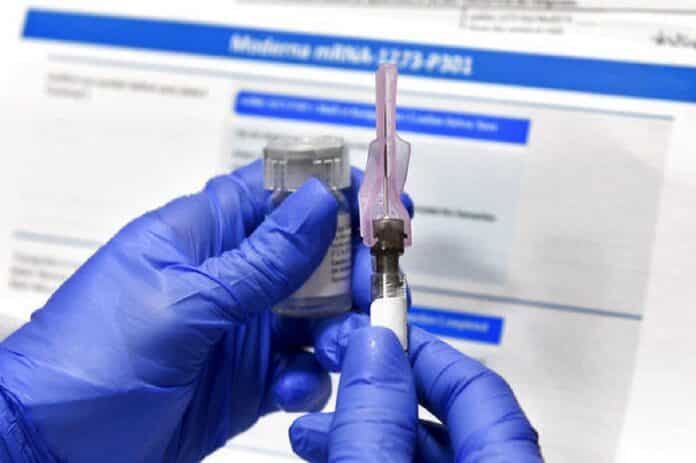
COLUMBUS, Ind. — As Indiana’s vaccination efforts continue, eligibility has opened up to a number of groups, including healthcare workers, first responders, long-term care residents and Hoosiers 65 years and older.
However, it’s unclear when another major group of front line workers — one that has dealt with constant upheaval amid the pandemic — will be added to this list.
At the moment, there isn’t a set date for when teachers and other school staff will become eligible for vaccination in Indiana.
All four states that border Indiana — Illinois, Kentucky, Michigan and Ohio — are vaccinating teachers. In fact, 27 states are vaccinating teachers, and all but six have a timeline for when teachers will be vaccinated, according to Education Week. Indiana does not.
Local superintendents have said that teacher vaccinations would help schools return to — or, in some cases, maintain — in-person learning.
“Our goal is to keep school in session as much as possible and in-person,” said Superintendent Shawn Price of the Flat Rock-Hawcreek School Corp. “I do believe that that’s best for our kids. And we have a better chance of doing that if our teachers can remain in the classroom, and vaccines have become an important part of that.”
Flat Rock-Hawcreek schools returned to in-person learning on Jan. 11.
Bartholomew Consolidated School Corp. is offering in-person learning for elementary schools and a hybrid model for secondary schools. Both school corporations have also provided virtual options for students.
BCSC Superintendent Jim Roberts said that vaccines would help schools that are trying to determine how to return to in-person learning.
“I would support our teachers getting the vaccinations sooner rather than later,” he said. “And I’ve had the opportunity to verbalize that in certain forums and in contact with the department of health, from time to time. But with all of that said, I do understand that there are a certain number of dosages.”
Because of the limited number of doses, the state has had to make decisions about distribution using data and other factors, Roberts said. He also acknowledged that the state is focusing on “the most at-risk populations” first in order to stem the number of COVID-19 deaths and hospitalizations.
Price said he too understood the vaccine shortage.
“I’m an advocate for educators receiving those vaccines, but I do know that there’s not enough vaccines to get that out right away. And I understand the state having to make those tough calls about prioritizing.”
Austin Glaub, who teaches eighth grade U.S. history at Northside Middle School, said that he agrees with the state’s emphasis on helping at-risk individuals first.
“As somebody who is 25 years old, relatively healthy, I am not in any way, shape or form in any of the high-risk groups,” he said. “So personally … while there are a limited number of doses of the vaccine, I would prefer those vaccine doses go to those who are in the high-risk groups, who are at more risk of developing severe complications.”
This methodology still allows teachers in high-risk groups access to the vaccine, Glaub said, who added that he feels good about how Northside has implemented COVID-19 protocols. He said he thinks it is unlikely he would be infected at work.
Even with that, some teachers are feeling anxious and want to be vaccinated now, Roberts said. He shared that sentiment, though he also said it’s also a complex problem. Vaccinations would help teachers feel more safe, he said.
Offering vaccines to teachers would help quell certain anxieties, said BCSC Transition Coordinator Mary Hamlin.
For instance, one concern she’s discussed with other educators is that of potentially exposing students to COVID-19. Some of her peers are getting antibody tests in the hopes of learning that they might already have some level of protection from the virus, she said.
Another concern is that some teachers have had “consistent exposures” to the virus and have run out of their paid leave for COVID-19, Hamlin said.
Uncertainty can also be a source of stress, she said.
“What we are experiencing is day-to-day unknown,” Hamlin said. “And our role often is to have consistency and stability for our students. And when we don’t even have that for ourselves, it’s really hard to provide that for our students. And so that increases the anxiety.”
Students would benefit from consistency and a return to “real school without any of the COVID changes,” Hamlin said.
“My peers are incredible at what they do and how they care for their students,” she said. “And they just don’t feel like they’re ever doing well enough.”
Hamlin also pointed to how, in November, staffing was one of the issues that led to district-wide eLearning. At the time, BCSC officials said the number of positive cases and their resulting close contacts — both inside the school corporation and throughout the larger community — had caused problems with bus transportation and staffing classrooms.
Hamlin said that she would prefer educator vaccinations to begin immediately.
“We should be a priority,” she said. “I think we have shown that the school corporation is a big part of keeping the economy open and moving, so that parents can continue to work.”
In preliminary conversations, teacher leadership has indicated that they agree with him that it would be beneficial to have teachers vaccinated so that in-person education can continue, Price said.
Roberts said that he’s continuing to advocate that teachers “be put on the list as high as possible and as quickly as possible.” He also said that educators “are of the highest priority” in terms of the valuable services they provide both in education and to communities.
“They (teachers) want the shots now, the vaccinations now,” he said. “Now, whether we’re all in the same place about understanding the process that has to go into making that complex decision, I don’t know. But we all want the same thing, which is to have teachers vaccinated as soon as possible. And my guess is the governor would say the same thing.”
While a start date for teacher vaccinations has not yet been set, state health commissioner Dr. Kristina Box said at the governor’s Feb. 3 press conference that the state will send schools more than a million KN95 masks for teachers and staff, about 600,000 masks for K-6 students and hand sanitizer.
She also said that schools will be provided with BinaxNOW antigen test cards to schools “to help them test symptomatic students and teachers.” In her presentation, Box said that the state is sending an initial amount of 120 tests to each school.
The state also announced Monday that public and private schools across Indiana will receive approximately over $881 million in federal emergency relief funding provided by the Coronavirus Response and Relief Supplemental Appropriations Act.
However, in perhaps an ominous note, Columbus North High School announced Monday that its varsity basketball season was ending its regular season early and will quarantine two weeks after one of its players tested positive for the virus. The team is hoping to be able to resume competition at the sectional, but will miss several key conference games that will determine the conference championship.
Just because most teachers aren’t eligible to be vaccinated doesn’t mean they aren’t valued, Gov. Eric Holcomb said in last week’s COVID-19 press conference.
“I disagree with the premise that I don’t value them. I have talked to teachers as well who appreciate that we are taking care of their grandmother or grandfather,” Holcomb said. “They are OK with us focusing on those most at-risk. I value every single life in this state, regardless of your profession.”




